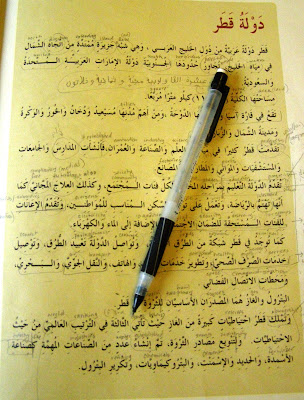When I was 15 years old, thanks to my adventurous parents, Indiana Jones and Marian Ravenwood (aka Charles Hedrick and Peggy Hedrick), I lived in Cairo, Egypt - where the language of the street was Egyptian Arabic:
Indy, Marian, Kay and Cindi on top of the Great Pyramid, New Year's Day 1975
Minus brother Charles Hedrick, Jr. who slept in that morning (slacker!)
I jogged around the sphinx, visited Tut's tomb and sort-of-met Henry Kissinger.
sneaking a peek, 1974
Most locals did not speak English.
Surrounded by the language, I learned to produce Arabic sounds like:
the hissing cat (khal - خ)
the gargle (ein - ع)
choking-on-a-bone (ghein - غ).
Later, I returned to Cairo alone during a college year abroad and my Egyptian Arabic came right back.
So, relearning the language in Doha should be easy, right?
Wrong.
There are two very distinct categories of Arabic: "Street" Arabic, which encompasses a multi-bazillion number of dialects. And Modern Standard Arabic, which is the language of the Koran, education and the foundation for all those multi-bazillion dialects.
"Street" Arabic varies from one country/area/neighborhood/family to another and are not written languages.
Modern Standard Arabic is written and read all over the Arab world and among Muslims in every country everywhere…but generally - it is not spoken.
from my workbook: doula Qatar (Country of Qatar)
In Qatar, locals speak a form of the Gulf ("Khaleeji") dialect - which is very different from Egyptian Arabic.
Arab nationals from Syria, Lebanon, Yemen, Bahrain, Saudi Arabia, Emirates, Egypt...along with Muslims from every country in the world live and work in Doha. All speaking their own form of Arabic.
While most do not speak a second dialect, nearly everyone understands MSA.
Many Arabs are surprised to hear MSA spoken by a Westerner. Often…they laugh. I am told that I have an "Egyptian accent" which somehow makes everything funnier.
But when the laughing is done…communication happens.
So why learn MSA? Here are a few reasons:
- More than 250 million people comprise the Arab world (New World Encyclopedia)
- Nearly 26% of the world's population, approximately 2 billion people, are Muslim (Islamic Web)
- Educated Arabs read, write and understand MSA, regardless of their home dialect
- Muslims often understand MSA, regardless of their home country or native language
- Arabic is a beautiful, musical language, thick with nuance
- Knowledge of MSA is necessary to study the Koran, read Arabic books, street signs, menus and more
- The best way to understand a culture is through its language
And if you're ever in a Arab country where you don't know the dialect - you might still rent a horse…or camel.
Katie and Kimber hanging out in the Qatari desert




3 comments:
So proud of you! I know it has been a lot of work, but I bet it is fun being able to use it...
Thanks! I've had a nice vacation from study (since I've been home), but gotta get back to work now...!
OMG! What a wonderful experience and by the way that last photo looks like you and your sister Kay, who also gave your parents (just Charlie and Peggy) fits in Cairo.
Post a Comment